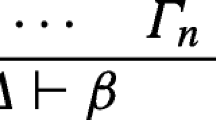Abstract
In my paper I am concerned with Peter van Inwagen's Consequence Argument. I focus on its probably best known version. In this form it crucially employs the notion of rendering a proposition false, anotion that has never been made sufficiently clear. The main aim of my paper is to shed light on thisnotion. The explications offered so far in thedebate all are based on modal concepts. Iargue that for sufficient results a ``stronger'',hyper-intensional concept is needed, namely theconcept expressed by the word ``because''. I show that my analysis is superior to the prior ones. On the basis of this analysis I further explain why van Inwagen's argument fails.
Similar content being viewed by others
REFERENCES
Aristotle: The Complete Works of Aristotle, 4th edition. Jonathan Barnes (ed.), Princeton; Guildford: Princeton University Press, 1991.
Bennett, J. (1988): Events and Their Names, Indianapolis; Cambridge: Hackett.
Bolzano, B. (1837): Wissenschaftslehre (in four volumes), Reprint, Leipzig: 1981.
Crisp, T. and Warfield, T. (2000): ‘The Irrelevance of Indeterministic Counter-examples to Principle Beta’, Philosophy and Phenomenological Research 61, 173–184.
Davidson, D. (1967): ‘Causal Relations’, in D. Davidson (1980), Essays on Actions and Events (pp. 149–162), Oxford: Clarendon Press.
Fischer, J.M. (1983): ‘Incompatibilism’, Philosophical Studies 43, 127–137.
Fischer, J.M. (1986): ‘Van Inwagen on Free Will’, Philosophical Quarterly 36, 252–260.
Fischer, J.M. and Ravizza, M. (1996): ‘Free Will and the Modal Principle’, Philosophical Studies 83, 213–230.
Horgan, T. (1985): ‘Compatibilism and the Consequence Argument’, Philosophical Studies 47, 339–356.
Künne, W. (1992): ‘Bolzanos blühender Baum — Plädoyer für eine nichtepistemische Wahrheitsauffassung’, in Forum für Philosophie Bad Homburg (ed.), Realismus Und Antirealismus (pp. 224–244), Frankfurt am Main: Suhrkamp.
Lewis, D. (1981): ‘Are we Free to Break the Laws’, in David Lewis (1986), Philosophical Papers II, Oxford: Oxford University Press.
Mellor, D.H. (1987): ‘The Singularly Affecting Facts of Causation’, in D.H. Mellor (1991), Matters of Metaphysics (pp. 201–224), Cambridge: Cambridge University Press.
Simons, P. (1997): ‘Higher-Order Quantification and Ontological Commitment’, Dialectica 51, 255–271.
Steward, H. (1997): The Ontology of Mind, Oxford: Clarendon Press.
Tatzel, A. (forthcoming): ‘Bolzano's Theory of Ground and Consequence’, to appear in Notre Dame Journal of Symbolic Logic.
Temple, D. (1988): ‘The Contrast Theory of Why-Questions’, Philosophy of Science 55, 141–151.
Van Fraassen, B. (1980): The Scientific Image, Oxford: Clarendon Press.
Van Inwagen, P. (1975): ‘The Incompatibility of Free Will and Determinism’, Philosophical Studies 27, 185–199.
Van Inwagen, P. (1977): ‘Reply to Narveson’, Philosophical Studies 32, 89–98.
Van Inwagen, P. (1983): An Essay on Free Will, Oxford: Clarendon Press.
Williamson, T. (1999): ‘Truthmakers and the Converse Barcan Formula’, Dialectica 53, 253–270.
Author information
Authors and Affiliations
Rights and permissions
About this article
Cite this article
Schnieder, B.S. Compatibilism and the Notion of Rendering Something False. Philosophical Studies 117, 409–428 (2004). https://doi.org/10.1023/B:PHIL.0000016484.52149.52
Issue Date:
DOI: https://doi.org/10.1023/B:PHIL.0000016484.52149.52



